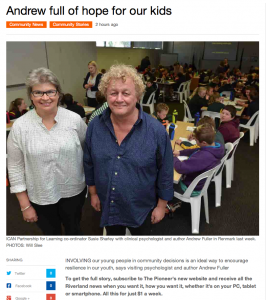Clinical psychologist Andrew Fuller has honed his clear, accessible advice over years of working with all sorts of people in all sorts of relationships. His advice is tried and tested – and will help you get your relationship back on track.
The London Times reports on how to unlock your child’s genius, featuring Andrew Fuller’s book.
Andrew Fuller talks about his new book!
Psychologist and author Andrew Fuller was featured in the Murray pioneer, talking about encouraging resilience in young people by involving them in the community and the decisions made.

There are ways you can connect with teens and it all comes down to understanding what’s going on inside their heads. This morning clinical psychologist Andrew Fuller joined us with his advice.
Unfortunately, this video link from Today is no longer available.
By Andrew Fuller and Andrew Wicking
Over the past year, Resilient Youth Australia has surveyed 16,439 young Australians in year levels 4 – 12 to gain a picture of their resilience.
The information collected is used across Australia by schools and communities to prioritise resilience interventions that build upon the strengths of young people as well as addressing areas of risk and vulnerability.
The strengths of Australian young people
40% of young people have excellent or good levels of resilience.
Girls have higher levels of resilient than boys.
The areas of strength for young Australians are boundaries and expectations and a sense of connectedness to the adults in their lives including parents and teachers. A sense of feeling empowered enough to right wrongs and injustice is also a relative strength.
We know that the most powerful antidote to suicide, violence and drug abuse is the sense of belonging people have in their lives. Girls and boys have good levels of belonging to their families. Girls also have good levels of belonging to their school and friendship group while boys score in the fair range in these two areas.
83% report being highly engaged at school and 79% value success for themselves.
67% report that they are very hopeful about the future. 64% of young people are feel they are doing pretty well most or all of the time. Persistence is also an area of strength with 58% reporting that they can find ways to solve problems when others would give up trying.
62% of young people do not see violence as a way of solving interpersonal problems. 75% are not at risk of alcohol problems and 91.5% are not at risk of illegal drug problems. 86% do not gamble.
In essence we have a large group of capable young people who are well linked to their families, engaged in school and are positive about their future. They do not see violence and bullying as appropriate and are not inclined to experiment overly with alcohol or illegal drugs.
Areas of concern
While 25% report having been cyber-bullied in the past year, an alarming 48% report having been bullied at school in the same time period. 13% of young people report that they have been bullied in school at least 5 times in the last 12 months.
28% of boys and 38% of girls say that they have lost too much sleep.
33.4% of all young people tell us they text at least once every night between the hours of 10pm and 6am and 24.3% text many times throughout the night.
79% of girls say that they are able to face up to their problems, but 34% report that they are losing confidence and feeling unhappy and depressed.
82% of boys say that they feel reasonably happy, but 29% report that they are constantly under strain, and 24% report losing confidence.
24% of young people say they do not feel they would be able to say no to sexual approaches they do not want.
Mental health remains a concern with 19.5% of girls and 12% of boys reporting an acute level of symptoms.
The major issues reported are:
Girls
- Sleep disturbance
- Feeling under strain
- Unhappy & depressed
- Losing confidence
- Unable to overcome difficulties
Boys
- Feeling under strain
- Unable to overcome difficulties
- Sleep disturbance
- Unhappy & depressed
- Losing confidence
The areas where young Australians rated most poorly were positive identity, positive values and social skills.
The process of increasing resilience
We will publish evidence in subsequent papers that indicates that the following process powerfully increases resilience in schools and communities:
- Complete the on-line Resilience Survey;
- Share results with students, school staff and the local community;
- Convene focus groups of young people to discuss the results where they will endorse some findings and explain or refute others;
- Consider resilience building options that capitalise on the strengths of the local young people to lift the areas of vulnerability;
- Discuss opportunities with students, school staff, parents and community members. Resilient Youth Australia has developed an e-book for all clients, full of low cost ideas to kick start your planning;
- Implement your resilience building initiatives;
- Repeat the survey annually to evaluate successes to date and to further refine future interventions.
Areas we need to act on with urgency
The quality of relationships in our schools and communities is a matter of priority. Only 65.5% of all young people tell us that they have adults in their life who care about them. Even less, 62% report that they have adults in their lives who listen to them.
While 74% of young people report having two or more groups of friends, the high levels of bullying leave too many of young people feeling alone and frightened.
While the majority of the young people are engaged in school and feel connected to adults, imagine what results we could achieve if we prioritised the creation of positive relationships where young people can thrive and excel in a supportive learning environment.
What’s the next step?
Over 70 schools have completed the survey. Increasingly local councils are using the survey to sharpen the focus of their processes of supporting their young people.
If you are interested in enquiring about completing the survey, please contact:
Dr. Andrew Wicking, Research Manager
PO Box 32, Black Rock, 3193 Australia
Phone: +61 400 113 945
If you would like further information, please contact:
Email: [email protected] Website: http://resilientyouth.org.au
If you would like to download free materials related to these topics go either to the Resilient Youth Australia website or Andrew Fuller’s Free Resources section.
If would like to contribute to the conversation about resilience: https://www.facebook.com/ResilientYouthAustralia
About the implications this research has for learning and brains: https://www.facebook.com/pages/The-Learning-Brain/140411476069391?ref=br_tf
Or about the prevention of bullying: https://www.facebook.com/AndrewFullerBullyStoppers
Finally we would like to thank the schools, communities and young people who have participated in the survey to date.
Clinical psychologist Andrew Fuller, the author of Tricky Teens, Tricky Kids and Help Your Child Succeed At School, and Yump, one of Melbourne’s brightest digital agencies, have put their creative brains together to reimagine and revitalise AndrewFuller.com.au as the essential online resource for parents, students, teachers, schools and allied health professionals working with young people and their families. The new website was launched to coincide with the release of his latest book Tricky Teens, which quickly ascended to the number 1 parenting book at Dymocks Australia.
Described as someone who “puts the heart back into psychology”, Andrew is a well known psychologist who works with many schools and communities on resilience, neuroscience and learning, both in Australia and internationally. He is an influential voice on a wide range of subjects including the promotion of mental health in schools, substance abuse prevention, suicide prevention and the reduction of violence and bullying. The challenge faced by Yump, the Melbourne digital agency behind the website, was to present Andrew’s new ideas in ways that would reach and excite new audiences and engage them in an ongoing relationship with him.
Arriving at the relaunched AndrewFuller.com.au, the colourfully designed homepage allows visitors, such as students, parents, schools and professionals, to self-identify and take their respective guided pathway to the resources that they need. The Free Resources section is a regularly-updated repository of downloadable articles that will help kickstart their thinking and tackle the obstacles ahead, such as in the areas of managing depression and anxiety, building resilience and overcoming the challenges of school and adolescence.
For practical insights delivered in a warm, approachable manner, visitors can purchase affordable e-Books including Guerrilla Tactics For Teachers, Work Smarter Not Harder and Beating Bullies from the Books section via an easy-to-use online shopping cart interface. The Talks section features workshops conducted by Andrew for organisations, parents, students, teachers and health professionals on a broad variety of topics. Last but not least, Andrew also keeps visitors up to date with ideas and concepts related to the well-being of young people on his Blog.
The Melbourne web design experts at Yump have created the entire experience using the user-centred design methodology, a process that focuses on the website user first. This means making the interface simple to use so that different users can easily access the information they want. With big touch-friendly buttons and a fluid responsive layout, the web design is optimised for mobile devices such as hand-held tablets and mobiles, and developed using best practice web techniques.
Not merely satisfied with meeting functional requirements, the team at Yump wants to ensure the experience at AndrewFuller.com.au, like the author and psychologist, also has heart and soul. From the homepage’s “spaghetti brain” illustration to the choice of colours and tone of language, the website invites visitors to learn about resilience, mental health and well-being while being immersed in a creative and interactive world.
